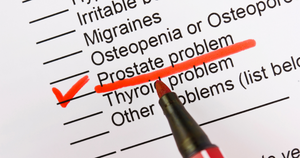Prostate Surgery - Managing Incontinence After
January 26, 2022

Managing Incontinence After Prostate Surgery
Incontinence affects many people, both men and women, across the country and around the world. Often, it is a symptom of another health issue (being overweight, infections, diabetes and neurological disorders, just to name a few). In other cases, it is a result of growing older and not being able to access the rest room as quickly as one needs or other aging conditions like arthritis (and not being able to unbutton clothing in a timely fashion.)
In still other instances, incontinence can be a side effect of medicine and medical procedures. Quite often, men will experience this issue after prostate surgery. However, just because the incontinence is the result of a medical procedure doesn’t make it any less embarrassing. Suffering from incontinence makes many want to avoid socializing; they simply don’t want to leave their homes. Below, we shared some tips to manage incontinence while you recover from your procedure.
Engage in Pelvic Floor Exercises
You may have heard these referred to as kegels. These exercises are designed to strengthen the muscles around the pelvic floor, helping to prevent leakage. Talk to your doctor about any exercises and get his/her recommendation on how best to proceed.
Manage Your Diet
Certain foods are just bad for incontinence. They irritate your bladder and can cause spasms. These can include caffeine, alcohol, citrus and spicy foods, just to name a few. You can try removing and reintroducing one and a time to help identify which foods impact you the most.
Leverage Available Protective Products
Today there are a host of available protective products for sale. Personal items like male guards and disposable underwear can be incredibly valuable. When wearing these you can go about your business without worrying about embarrassing urinary leakage.
Additionally, there are additional items that can help protect your furnishings, including chairs, mattress and even car seat covers. These can be a good investment since urine can stain and it leaves an unpleasant residual odor.
Prostate Surgery Induced Incontinence
Thankfully, prostate surgery induced incontinence is usually not a permanent condition. It usually resolves in a few weeks or months. And, by leveraging the tips above you can mitigate any embarrassment while you recover.
In all cases, you should share any urinary incontinence issues, post-surgery, with your physician. He or she needs to be fully aware of how you are reacting to the surgery to treat you appropriately. And, your doctor can also provide more specific advice on how to manage this condition.
AT LIQUAGUARD® WE UNDERSTAND THAT INCONTINENCE CAN BE FRUSTRATING AND EMBARRASSING, AFTER PROSTATE SURGERY. WE RECOGNIZE HOW DIFFICULT IT CAN BE TO MANAGE, BOTH PHYSICALLY AND EMOTIONALLY. WE ENCOURAGE OUR CUSTOMERS TO CONSULT WITH THEIR PHYSICIANS AND WE ARE PROUD TO SUPPLY A BROAD RANGE OF PRODUCTS TO MAKE LIVING WITH INCONTINENCE A LITTLE BIT EASIER.
VISIT OUR WEBSITE TO SEE OUR COMPLETE INVENTORY. AND, CALL US WITH QUESTIONS. WE LOOK FORWARD TO HELPING YOU FIND THE BEST PRODUCTS FOR YOUR NEEDS. WE CAN HELP IMPROVE YOUR QUALITY OF LIFE.
Share:


